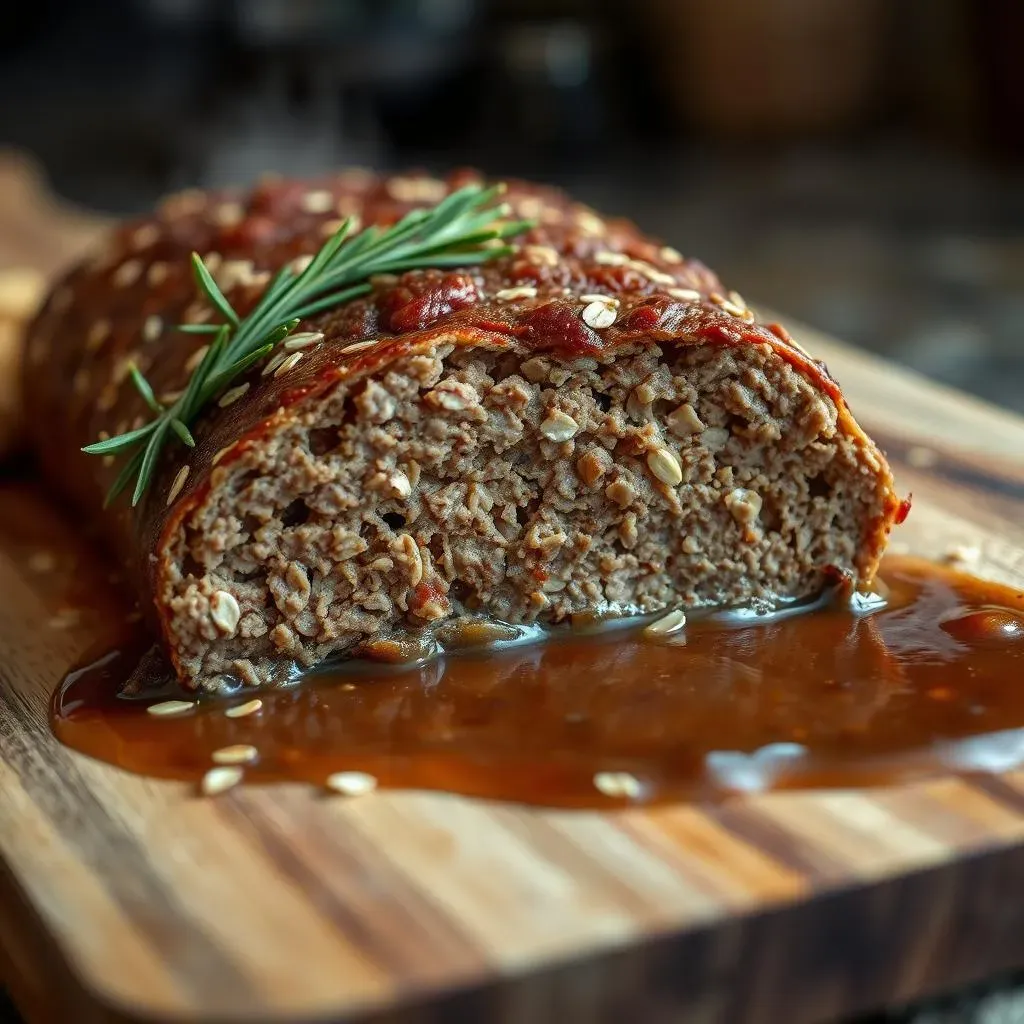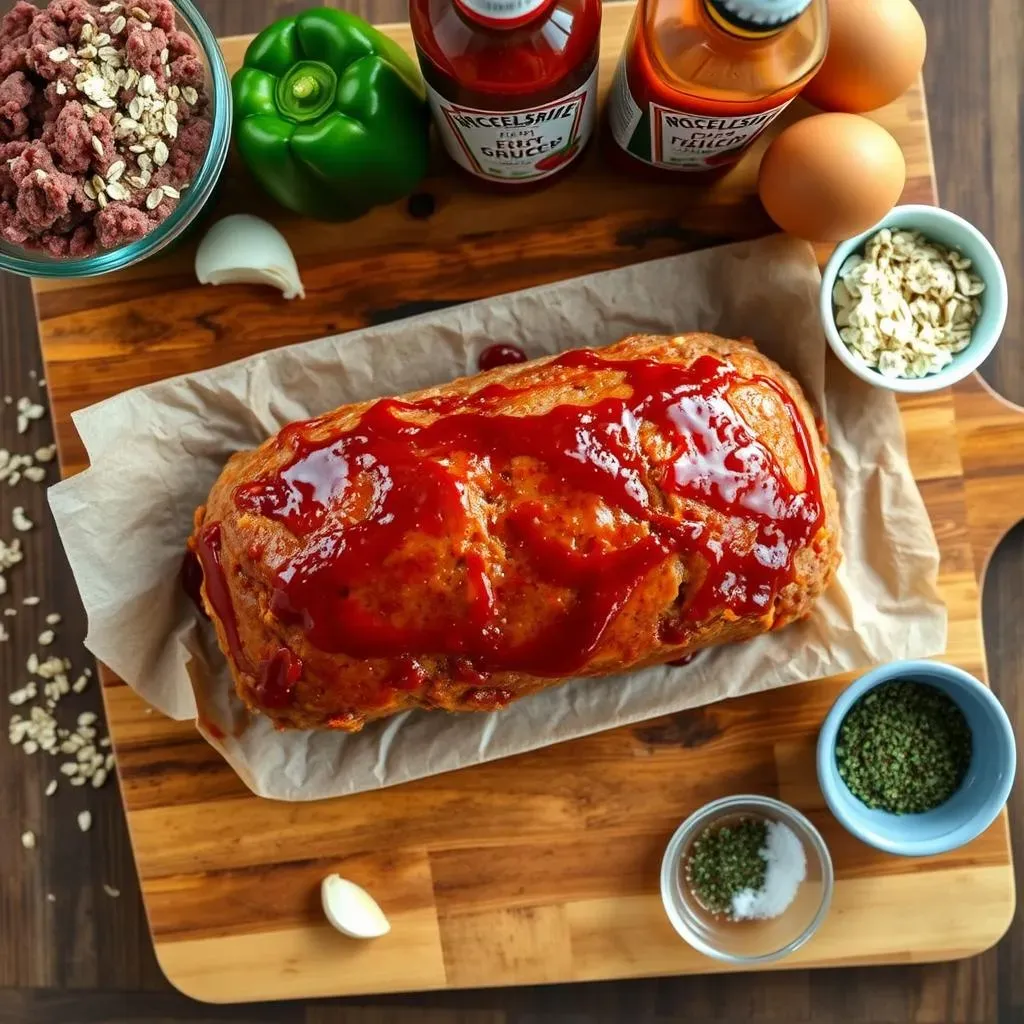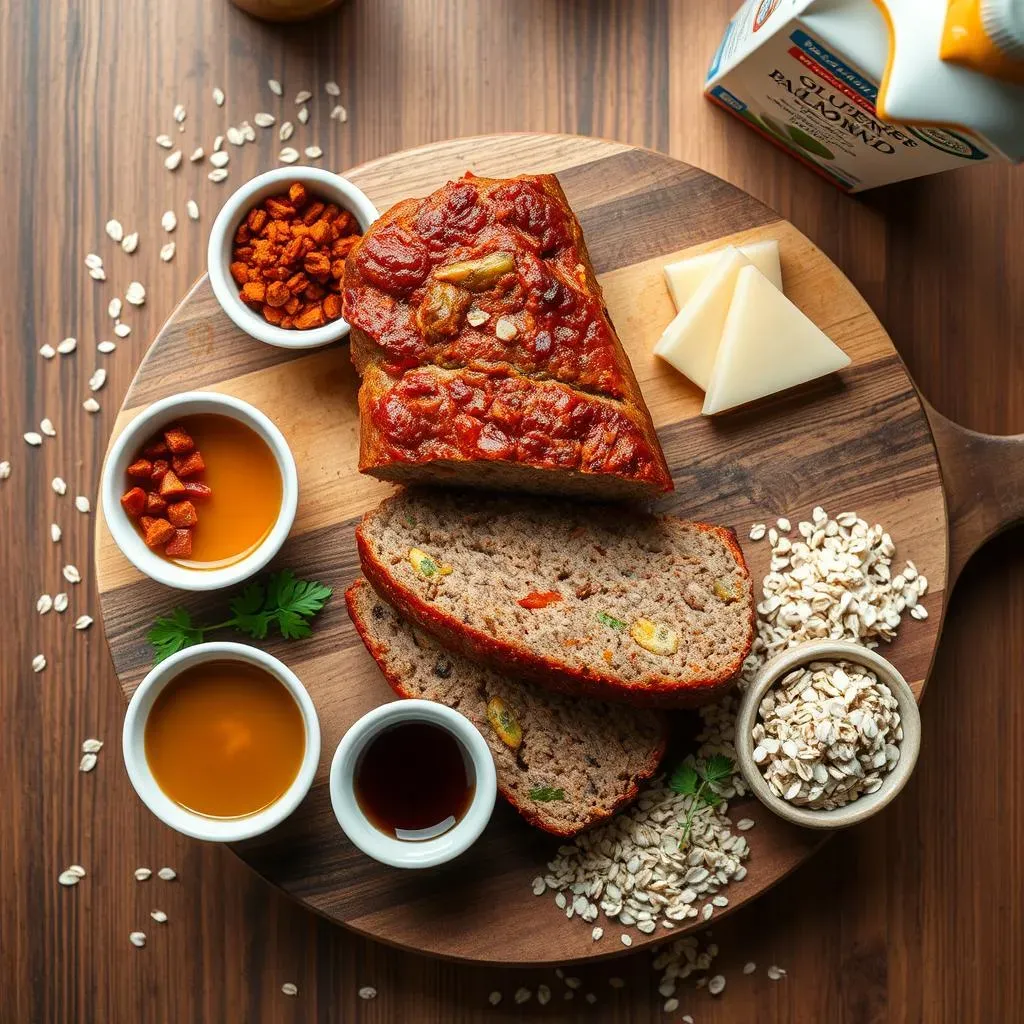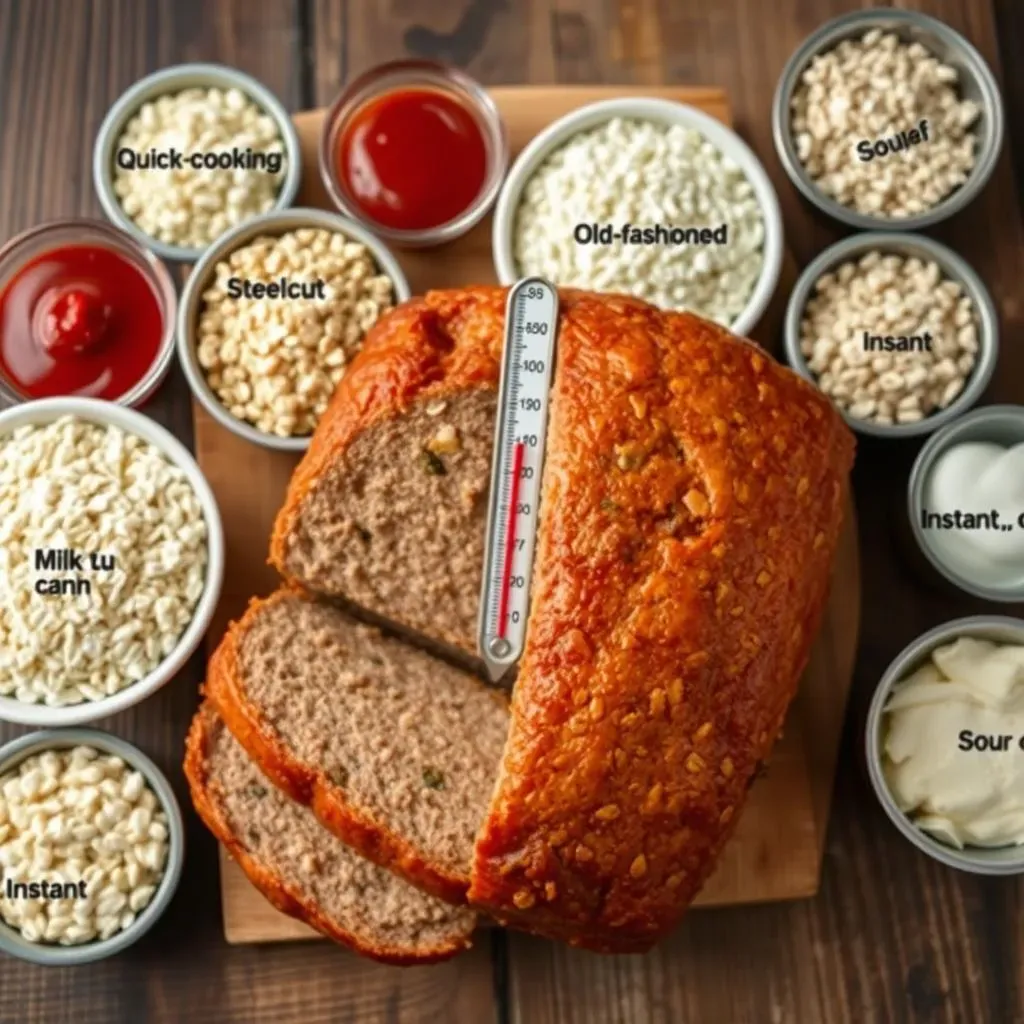Ever wonder how to make a meatloaf that's juicy, tender, and packed with flavor? The secret ingredient might just be sitting in your pantry: oatmeal! This homemade meatloaf recipe with oatmeal is a classic comfort food dish, reimagined with a simple twist that elevates it to a whole new level. Forget dry, crumbly meatloaf – the oatmeal acts as a binder, locking in moisture and creating a texture that's simply irresistible.
Why Oatmeal Makes the Best Meatloaf: A Tender and Moist Secret

Why Oatmeal Makes the Best Meatloaf: A Tender and Moist Secret
The Science Behind the Softness
so you're probably thinking, "Oatmeal? In meatloaf?" I get it. It sounds a little out there, but trust me on this. The magic of oatmeal lies in its ability to absorb moisture like a sponge. When you mix it with ground meat, eggs, and other ingredients, it soaks up all those delicious juices that would normally escape during cooking. This keeps your meatloaf incredibly moist and prevents it from drying out, which is the cardinal sin of meatloaf making.
But wait, there's more! Oatmeal also acts as a fantastic binder. It helps hold all the ingredients together, preventing the meatloaf from crumbling apart when you slice it. Plus, it adds a subtle, nutty flavor that complements the savory taste of the meat. It's a win-win-win situation, really.
Oatmeal vs. Breadcrumbs: The Ultimate Showdown
Now, you might be wondering, "Why oatmeal instead of breadcrumbs?" That's a fair question. Breadcrumbs are a classic meatloaf ingredient, but oatmeal offers some distinct advantages. First, oatmeal tends to absorb more moisture than breadcrumbs, resulting in a juicier meatloaf. Second, oatmeal has a slightly coarser texture, which helps prevent the meatloaf from becoming too dense or mushy.
Finally, oatmeal is a whole grain, which means it's packed with fiber and nutrients. So, you're not only making a more delicious meatloaf, but you're also adding a healthy boost to your meal. It's a simple swap that makes a world of difference.
Ingredient | Moisture Absorption | Binding Ability | Flavor |
|---|---|---|---|
Oatmeal | High | Excellent | Subtle, Nutty |
Breadcrumbs | Medium | Good | Neutral |
Classic Homemade Meatloaf Recipe with Oatmeal: StepbyStep

Classic Homemade Meatloaf Recipe with Oatmeal: StepbyStep
Gather Your Ingredients: The Meatloaf Lineup
Alright, let's get down to business! To make this classic homemade meatloaf recipe with oatmeal, you'll need the following ingredients:
- 2 pounds ground beef (80/20 blend is ideal)
- 1 cup quick-cooking oats (not instant!)
- 1 medium onion, finely chopped
- 2 cloves garlic, minced
- 1 green bell pepper, finely chopped (optional, but adds great flavor)
- 2 large eggs, lightly beaten
- 1/2 cup milk
- 1/4 cup ketchup
- 2 tablespoons Worcestershire sauce
- 1 teaspoon dried thyme
- 1 teaspoon dried oregano
- 1/2 teaspoon salt
- 1/4 teaspoon black pepper
For the glaze (optional, but highly recommended):
- 1/2 cup ketchup
- 2 tablespoons brown sugar
- 1 tablespoon apple cider vinegar
Mixing and Shaping: Getting Your Hands Dirty
Now comes the fun part! In a large bowl, combine the ground beef, oats, onion, garlic, bell pepper (if using), eggs, milk, ketchup, Worcestershire sauce, thyme, oregano, salt, and pepper. Gently mix everything together with your hands until just combined. Be careful not to overmix, as this can make the meatloaf tough.
Once the ingredients are mixed, shape the mixture into a loaf on a baking sheet lined with parchment paper or foil. This makes for easy cleanup later! If you want to get fancy, you can use a loaf pan, but I find that a free-form loaf cooks more evenly.
Baking and Glazing: The Home Stretch
Preheat your oven to 350°F (175°C). While the oven is heating up, prepare the glaze by whisking together the ketchup, brown sugar, and apple cider vinegar in a small bowl.
Bake the meatloaf for 60-75 minutes, or until it's cooked through and the internal temperature reaches 160°F (71°C). About 15 minutes before the end of the baking time, brush the glaze over the top of the meatloaf. This will give it a beautiful, glossy finish and add a touch of sweetness.
Once the meatloaf is done, let it rest for 10-15 minutes before slicing and serving. This allows the juices to redistribute, resulting in a more tender and flavorful meatloaf.
Step | Description | Time |
|---|---|---|
Mixing | Combine all ingredients in a bowl. | 10 minutes |
Shaping | Form the mixture into a loaf. | 5 minutes |
Baking | Bake at 350°F (175°C). | 60-75 minutes |
Glazing | Brush glaze over the top. | 15 minutes (before end of baking) |
Resting | Let it rest before slicing. | 10-15 minutes |
Customize Your Meatloaf: Flavor Variations and Ingredient Swaps

Customize Your Meatloaf: Flavor Variations and Ingredient Swaps
Spice It Up: Adding a Kick to Your Meatloaf
so you've got the basic homemade meatloaf recipe with oatmeal down, but what if you're feeling adventurous? Don't be afraid to experiment with different flavors and ingredients! One of the easiest ways to customize your meatloaf is by adding some spice. A pinch of red pepper flakes, a dash of cayenne pepper, or a swirl of sriracha can add a delightful kick to your dish. You could also try incorporating some smoked paprika for a smoky, savory flavor. Get creative and see what combinations you can come up with!
Ingredient Swaps: Making It Your Own
Want to change up the ingredients a bit? No problem! You can easily swap out the ground beef for ground turkey, ground chicken, or even ground lamb. Just keep in mind that leaner meats may require a little extra moisture, so you might want to add an extra egg or a splash of milk. You can also experiment with different types of vegetables. Diced carrots, celery, or mushrooms can add texture and flavor to your meatloaf. And if you're not a fan of ketchup, you can use tomato sauce or even barbecue sauce for the glaze.
Flavor Boosters: Secret Ingredients for a Standout Meatloaf
Looking for some secret ingredients to take your meatloaf to the next level? Try adding a tablespoon of Dijon mustard, a splash of balsamic vinegar, or a handful of grated Parmesan cheese. These little additions can add depth and complexity to your meatloaf, making it truly unforgettable. Another great trick is to sauté the onions and garlic before adding them to the meatloaf mixture. This will mellow out their flavor and prevent them from overpowering the other ingredients.
Dietary Adaptations: Gluten-Free and Other Options
Got dietary restrictions? No problem! This homemade meatloaf recipe with oatmeal can easily be adapted to suit your needs. For a gluten-free version, simply use gluten-free oats. You can also replace the milk with a non-dairy alternative, such as almond milk or soy milk. And if you're watching your sodium intake, you can reduce the amount of salt in the recipe or use a low-sodium Worcestershire sauce.
Adaptation | Ingredient Swap/Adjustment |
|---|---|
Gluten-Free | Use gluten-free oats |
Dairy-Free | Replace milk with almond milk or soy milk |
Low-Sodium | Reduce salt or use low-sodium Worcestershire sauce |
Oatmeal Meatloaf FAQs: Tips for Perfecting Your Homemade Loaf

Oatmeal Meatloaf FAQs: Tips for Perfecting Your Homemade Loaf
Why is my meatloaf dry?
Ah, the dreaded dry meatloaf! This is probably the most common meatloaf complaint out there. The good news is, it's usually an easy fix. The most likely culprit is overcooking. Meatloaf should be cooked to an internal temperature of 160°F (71°C). Using a meat thermometer is the best way to ensure you don't overcook it. Also, make sure you're using ground beef with a decent fat content (80/20 is ideal). Leaner meats tend to dry out more easily. Lastly, double-check that you're using enough oatmeal. It's the key to locking in moisture!
Another tip is to add some extra moisture to the mixture. A splash of milk, a dollop of sour cream, or even some grated zucchini can help keep your meatloaf nice and juicy. Experiment and see what works best for you!
Can I use different types of oatmeal?
This is a great question! While quick-cooking oats are generally recommended for this homemade meatloaf recipe with oatmeal, you can experiment with other types of oatmeal if you're feeling adventurous. However, there are a few things to keep in mind. Old-fashioned oats will add a chewier texture to your meatloaf, so you might want to pulse them in a food processor before adding them to the mixture. Steel-cut oats are not recommended, as they require a longer cooking time and won't soften properly in the meatloaf.
Instant oatmeal should also be avoided, as it can turn mushy and make your meatloaf too soft. If you do decide to use a different type of oatmeal, adjust the amount of liquid in the recipe accordingly. You might need to add a little more milk or ketchup to compensate for the oatmeal's absorbency.
Oatmeal Type | Texture | Recommended? | Notes |
|---|---|---|---|
Quick-Cooking Oats | Soft | Yes | Ideal for meatloaf |
Old-Fashioned Oats | Chewy | Yes, with adjustments | Pulse in food processor before adding |
Steel-Cut Oats | Very Chewy | No | Requires longer cooking time |
Instant Oatmeal | Mushy | No | Can make meatloaf too soft |
How do I prevent my meatloaf from cracking?
Cracked meatloaf might not be the prettiest thing in the world, but it doesn't necessarily mean you've done anything wrong. Cracking is often caused by the meatloaf expanding during baking and then contracting as it cools. However, there are a few things you can do to minimize cracking. First, make sure you're not overpacking the meatloaf mixture. Overpacking can make the meatloaf too dense and prone to cracking. Second, try scoring the top of the meatloaf with a knife before baking. This will give the meatloaf room to expand and prevent it from cracking in random places.
Finally, let the meatloaf rest for at least 10-15 minutes after baking. This will allow the juices to redistribute and help the meatloaf hold its shape. If your meatloaf does crack, don't worry! It will still taste delicious.
Homemade Meatloaf with Oatmeal: A Timeless Recipe for Modern Tables
From our kitchen to yours, this homemade meatloaf recipe with oatmeal is more than just a meal; it's a connection to tradition, a canvas for creativity, and a guaranteed crowd-pleaser. Whether you stick to the classic recipe or experiment with your own flavor combinations, the key is to enjoy the process and share the love. So, fire up your oven, gather your loved ones, and savor the warmth and comfort of a truly exceptional homemade meatloaf.